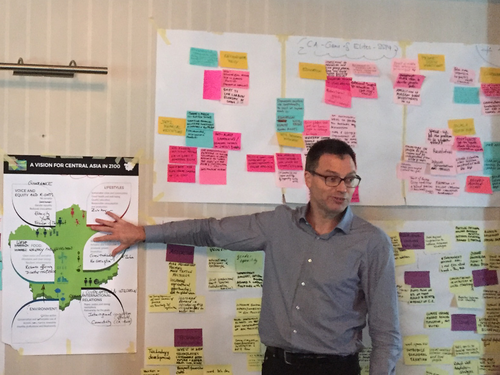From 23 to 24 May 2016, the IMPRESSIONS project hosted its second Central Asia case study in Baku, Azerbaijan. In a conference room overlooking the Caspian Sea, with Central Asia at the opposite end, 26 participants from Central Asia, Russia, China, Europe and beyond, discussed with the IMPRESSIONS team current and future challenges for the Central Asia region, against the backdrop of high-end climate change.

Central Asia is deeply affected by current climate variability. Future climate change is likely to bring significant risks to people, infrastructure and natural resources in the region, but the extent of future impacts depends on the quantity and quality of development in the region over the coming decades. The same climate impact – for example a prolonged drought – will have very different consequences depending on the social, political, economic and cultural features of the society that is impacted. That is one reason why it is especially important to consider the impacts of future climate change across a range of socio-economic scenarios.
 Following the first workshop in Kazakhstan in 2015, four regional socio-economic scenarios were developed that explore four distinct worlds in Central Asia until 2100. In Baku, these four scenarios, representing a plausible realm of possibilities for the future, were used as a basis for this strategy exercise in an intense two-day workshop: through an interactive process, the discussions focused on exploring the impacts of high-end climate change in Central Asia and its spillover effects in Russia and China; and comparing the respective strategic approaches for and towards the region, forming sets of strategies. In order to enable an integrated perspective on these issues, the attending stakeholders and experts represented civil society, businesses, research and international organisations, with expertise in various sectors such as water, energy, agriculture and security.
Following the first workshop in Kazakhstan in 2015, four regional socio-economic scenarios were developed that explore four distinct worlds in Central Asia until 2100. In Baku, these four scenarios, representing a plausible realm of possibilities for the future, were used as a basis for this strategy exercise in an intense two-day workshop: through an interactive process, the discussions focused on exploring the impacts of high-end climate change in Central Asia and its spillover effects in Russia and China; and comparing the respective strategic approaches for and towards the region, forming sets of strategies. In order to enable an integrated perspective on these issues, the attending stakeholders and experts represented civil society, businesses, research and international organisations, with expertise in various sectors such as water, energy, agriculture and security.
In the coming months, the IMPRESSIONS team will be compiling and analyzing the rich inputs received from the participants, in preparation for the third and final Central Asia case study workshop in 2017.